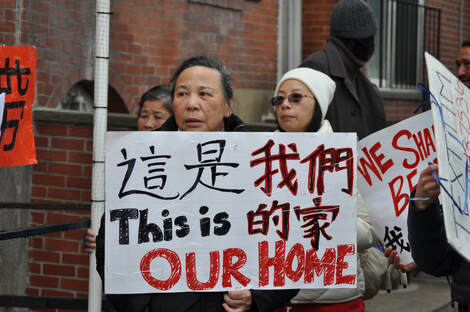What is the
Tenant Opportunity to Purchase Act?
|
What are the advantages of the TOPA bill?
|
How does the TOPA Enabling Act work?
In municipalities that adopt TOPA, multi-family property owners notify tenants and the municipality when they decide to sell a property. Tenants can form a tenant association, made up of tenants in at least 51 percent of the tenant-occupied units. The tenants association can designate its rights to a non-profit organization or local housing authority, or partner with an affordable housing purchaser.
The tenant association or its designee has the right to make a first offer to purchase after being notified of the sale. Additionally, when the owner enters a contract to sell the property to a third party, the tenant association/designee can agree to the sales price of the third-party contract. If they do, the tenant association/designee has a reasonable period of time to perform due diligence, secure financing, and close on the purchase of the building. Otherwise, the owner can sell to a third party.
The TOPA Enabling Act neither brings in additional revenue nor requires additional expenditures. As an enabling act, it simply allows municipalities to adopt tenant right-of-first-refusal ordinances. Existing state and local housing funding programs could be deployed to properties acquired via TOPA programs, and additional sources will be needed to fully stabilize neighborhoods and provide housing needed by low and moderate income tenants.
In municipalities that adopt TOPA, multi-family property owners notify tenants and the municipality when they decide to sell a property. Tenants can form a tenant association, made up of tenants in at least 51 percent of the tenant-occupied units. The tenants association can designate its rights to a non-profit organization or local housing authority, or partner with an affordable housing purchaser.
The tenant association or its designee has the right to make a first offer to purchase after being notified of the sale. Additionally, when the owner enters a contract to sell the property to a third party, the tenant association/designee can agree to the sales price of the third-party contract. If they do, the tenant association/designee has a reasonable period of time to perform due diligence, secure financing, and close on the purchase of the building. Otherwise, the owner can sell to a third party.
The TOPA Enabling Act neither brings in additional revenue nor requires additional expenditures. As an enabling act, it simply allows municipalities to adopt tenant right-of-first-refusal ordinances. Existing state and local housing funding programs could be deployed to properties acquired via TOPA programs, and additional sources will be needed to fully stabilize neighborhoods and provide housing needed by low and moderate income tenants.
